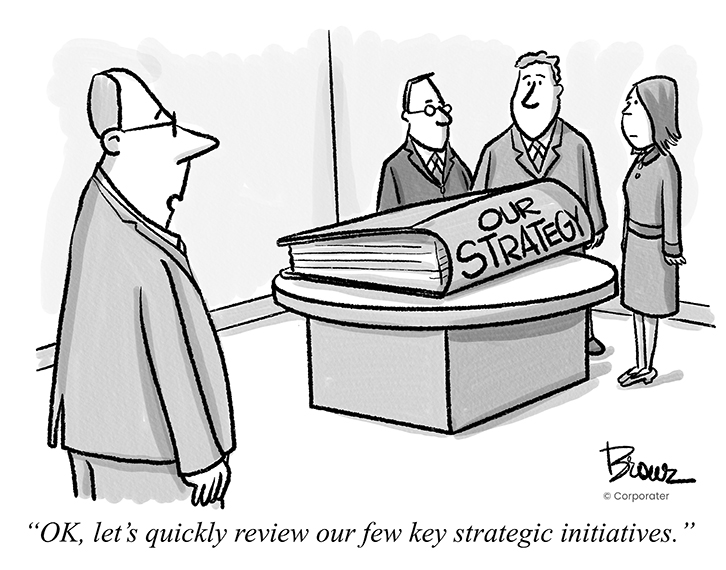
First, let’s define our terms. To us, a truly strategic initiative is a project you undertake to help ensure you meet or exceed performance targets on key performance measures you’ve identified as critical to strategy execution. Strategic initiatives will have a defined scope, finite duration, specific resources attached (both human and financial), and well-defined accountabilities assigned. What should be clear is that strategic initiatives aren’t designed to tackle day-to-day problems (although as a side benefit, they may do that) but instead are focused on driving significant improvements in targeted strategic areas. A strategic initiative could be anything from installing a customer relationship management system to launching a new career development program for your teams.
Most organizations we work with are literally drowning in projects they consider to be strategic. After conducting an inventory throughout the company, it’s not uncommon for larger firms to have a roster of a hundred or more. But are they truly strategic? Typically, the answer is no. Projects frequently spring up as a kneejerk reaction to an operational issue and ultimately take on a life of their own with little monitoring, evaluation, or demonstrated results. This takes a substantial toll on the organization in the form of wasted resources (especially time spent in endless meetings), redundant efforts, and increased costs. While no magic number of strategic initiatives exists, in our experience, even large and complex organizations should expect to be managing just a small portfolio of five to ten truly strategic initiatives. Outlined below are two “must dos” to ensure your pool of initiatives is, in fact, strategic.
- Map your projects to your strategic goals and objectives
This is the simplest and most powerful advice we can offer. Take the time and effort to critically examine each and every project in your organization, and map it back to your stated strategic goals. If a project is not serving an objective you’ve identified as strategic, it should be eliminated. This, however, is often easier said than done for a couple of reasons. First, many initiatives become the “pet project” of an executive who is loath to admit it isn’t contributing to the organization’s success. He or she may have a personal vested interest in its success and be reluctant to let it go. In this case, a strong chief executive is required to act in the best interests of the firm, despite any hard feelings that may engender. Second, many organizations will fall prey to the “sunk cost fallacy,” believing that although the project has yet to produce strategic benefits, they’ve invested significant resources already and that investment justifies future commitment to the project. - Track initiatives thoroughly
The global consulting firm McKinsey has reported that just over half of the organizations they surveyed track execution of their strategic initiatives. This is one of those head-shaking statistics that makes you want to scream, “What!” Given this evidence, there is little wonder that many projects run amok, racking up precious resources in the form of time and money, when nobody is watching. A vast body of easily accessible literature exists on project management, and step two for any strategic initiative should be adhering to the basics of sound project management (scope, resources, accountabilities, expected return on investment, milestones, etc.). Additionally, strategic initiative progress should be a standing item on senior executive business performance reviews.
It’s not uncommon to discover that you simultaneously have too many and too few strategic initiatives. Many organizations will have a multitude of projects that don’t meaningfully contribute to strategic aims, and too few that actually do move the needle on execution. Follow the steps above to ensure your time, energy, and precious resources are dedicated to the initiatives that really matter.

